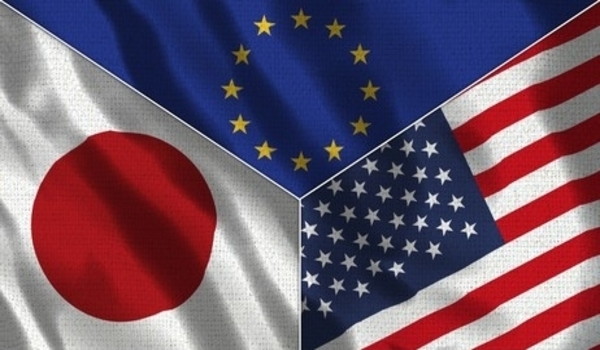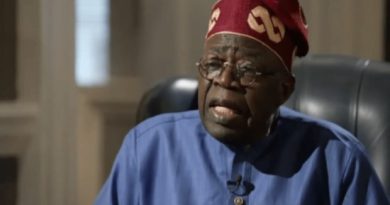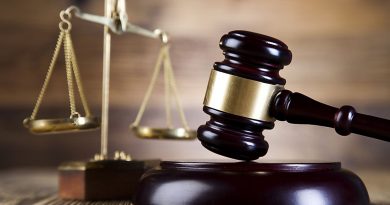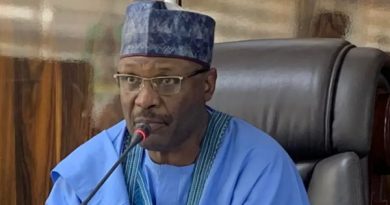Ukraine Tension: US to move additional troops to Baltic region as Washington says invading Ukraine was Putins plan all along; US, EU, Japan others sanction Russia; “risk of an all-out war is real”_ NATO
US President Joe Biden announced on Tuesday that the United States would continue providing security assistance to Ukraine. He said the US would redistribute troops in Europe to the three Baltic states Estonia, Latvia, and Lithuania on NATO’s eastern edge.
A senior US defense official said this includes repositioning 800 infantry soldiers in Italy and 20 attack helicopters in Germany to the Baltic region in the next few days.
The official also said 12 attack helicopters would be sent from Greece to Ukraine’s neighbor Poland, and up to eight F-35 fighter jets in Germany would be shifted to several locations in eastern Europe.
The three Baltic nations have expressed concern that the situation surrounding Ukraine could threaten their own security.
US Defense Secretary Lloyd Austin during his visit to Europe last week assured the Baltic states they would not be on their own if faced with security threats from Russia.
The defiant speech by Putin provoked immediate condemnation from European and US allies, who vowed to slap Moscow with a coordinated raft of sanctions.
“Russia’s decision to recognise the Ukrainian regions of Donetsk and Luhansk is illegal and completely unacceptable,” said von der Leyen.
The US, UK, EU, and Japan have unveiled sanctions against Russian individuals and entities on Tuesday in response to Putin’s recognition of the so-called Donetsk People’s Republic and Luhansk People’s Republic — two separatist-held areas in eastern Ukraine — and his announcement that troops would be sent in on “peacekeeping duties.”
US President Joe Biden announced the US was ordering heavy financial sanctions against Russian banks and oligarchs on Tuesday, declaring that Moscow had flagrantly violated international law by invading Ukraine.
“None of us will be fooled” by Russian President Vladimir Putin’s claims about Ukraine, the US President said in a live address from the East Room.
And he said more sanctions could be on the way if Putin proceeds further.
Biden said he was also moving additional American troops to the Baltic states on NATO’s eastern flank bordering Russia.
The European Union has agreed to sanction the 351 members of the State Duma who voted in favour of Russia’s recognition of the self-proclaimed people’s republics of Donetsk and Luhansk, in eastern Ukraine.
The new sanctions were adopted unanimously by all 27 member states at the end of an extraordinary meeting of foreign affairs ministers in Paris. The final details will be finalised in the coming days and the specific targets will be made public.
The bloc will also punish 27 individuals and entities accused of destabilising Ukraine, waging disinformation campaigns, and providing financial support to the two separatist regions.
The targets will come from the political, military, business, and media sectors, and will be subject to asset freezes and travel bans, which means they will not be allowed to enter or transit through EU territory.
“This is a clear escalation of Russian aggression against Ukraine,” said Josep Borell, the EU’s top diplomat, in a press conference in Paris.
“We demonstrate our determination to respond robustly to latest developments.”
The new package of sanctions also limits the Russian government’s access to the EU’s capital and financial services markets and blocks the refinancing of Russian sovereign debt. Banks that “finance the Russian military apparatus” will also be penalised.
Additionally, trade between EU countries and the breakaway regions is banned.
By going after commercial links, the bloc wants to prevent Moscow from raising additional funds that could be used to bankroll the military campaign that has begun in eastern Ukraine.
“We will make it as difficult as possible for the Kremlin to pursue its aggressive policies,” said European Commission President Ursula von der Leyen in a separate statement.
The EU is Russia’s biggest trade partner, accounting for 37.3% of the country’s total trade in goods in 2020, according to the European Commission. The bloc gets over 40% of its gas and 26% of its oil from Russia, a dependency that officials have rushed in recent weeks to palliate through the purchase of liquified natural gas (LNG) from countries like Norway, Qatar, and Azerbaijan.
Germany also announced it was halting the process of certifying the Nord Stream 2 gas pipeline from Russia – a lucrative deal long sought by Moscow but criticized by the US for increasing Europe’s reliance on Russian energy.
Both von der Leyen and Borrell praised Germany’s decision to stop the certification process of Nord Stream 2, the controversial gas pipeline that would bring extra Russian gas to Europe.
“I think the German government is absolutely right. Nord Stream 2 has to be assessed in light of the security of energy supply for the whole of Europe,” said von der Leyen.
Japanese Prime Minister Kishida Fumio has announced sanctions against Russia for its unilateral recognition of the independence of two regions in eastern Ukraine.
Kishida met reporters on Wednesday after discussing the issue with his chief and deputy chief cabinet secretaries.
Kishida said Japan will suspend the issuance of visas and freeze the assets of individuals linked to the pro-Russian regions, and impose a ban on trade.
The issuance and circulation of new Russian sovereign bonds will also be prohibited in Japan.
US Secretary of State Antony Blinken told reporters on Tuesday after talks with Ukraine’s Foreign Minister Dmytro Kuleba in Washington that Putin’s “plan all along has been to invade Ukraine, to control Ukraine and its people, to destroy Ukraine’s democracy.”
He also announced that a meeting with his Russian counterpart, Sergei Lavrov, scheduled on 24 February has been canceled, arguing Moscow is not serious about diplomacy.
Blinken said, “Now that we see the invasion is beginning and Russia has made clear its wholesale rejection of diplomacy, it does not make sense to go forward with that meeting at this time. I consulted with our allies and partners, all agreed,” he said.
The top diplomats were due to discuss the date and format of a possible summit between US President Joe Biden and Russian President Vladimir Putin.
The Duma voted in favour of recognition on 15 February, arguing the Western-aligned government in Kyiv posed a threat to the pro-Russian majority in the Donbas region.
The Donetsk People’s Republic (DPR) and the Luhansk People’s Republic (LPR) were established in the spring of 2014 following the Maidan Revolution and the ousting of President Viktor Yanukovych, a dramatic episode that took place exactly eight years ago.
President Vladimir Putin “really had this date clearly in mind,” said Borrell.
The Ukrainian government considers the DPR and LPR as terrorist organisations and sees the provinces as occupied territories, as the Crimea peninsula.
The bloc’s response comes after the US and the UK announced similar moves to cripple the economy of the DPR and LPR in a bid to add pressure on the Kremlin.
“We’re afraid, we believe this story has not finished,” said Borrell.
“The risk of conflict is real and we need to prevent it at all costs.”
The EU had previously imposed sanctions on 193 persons, such as judges, prosecutors and Duma legislators, and 48 entities accused of undermining Ukraine’s territorial integrity in Crimea and Sevastopol.
The latest raft of penalties comes as the Ukraine-Russia border standoff enters a new volatile and unpredictable phase that has laid bare the limitations of Western diplomacy.
After weeks of extreme tensions and a military build-up of more than 150,000 Russian troops, President Vladimir Putin disregarded pleas from European leaders and chose to answer the Duma’s call, recognising the two breakaway Ukrainian regions as independent.
On Monday evening, Putin delivered a lengthy, revisionist televised speech to justify his actions and challenge Ukraine’s legitimacy as a sovereign state.
“Modern Ukraine was entirely and fully created by Russia, more specifically the Bolshevik, communist Russia,” he claimed.
Members of Russia’s upper house, the Federation Council, voted unanimously to allow Putin to use military force outside the country – effectively formalizing a Russian military deployment to the rebel regions, where an eight-year conflict has killed nearly 14,000 people.
Putin’s statement covered the entire Donetsk and Luhansk provinces, far beyond the ceasefire line and the area currently held by separatist forces. He then ordered Russian troops to enter the Donbas region, a step that some fear could serve as a prelude to a full-fledged invasion of the entire Ukrainian state.
NATO Secretary-General Jens Stoltenberg warned Russian troops were ready to “strike” and that the risk of all-out war was “real”.
“Moscow has moved from covert efforts to destabilise Ukraine to overt military action,” he said.
Meanwhile, the European Union Commissioner for home affairs, Ylva Johansson said the body is ready and “well prepared” to take in refugees fleeing Ukraine.
Her comments come as fears grow that Russia’s intensifying military campaign could soon cause a wave of migrants seeking shelter in nearby EU countries. No major movements of people have been detected so far.
“The focus has been on the contingency planning for the very dangerous situation in Ukraine. We don’t know what would be the next step of [President Vladimir] Putin, but we have to be prepared if there will be a massive inflow of refugees of Ukrainians into the European Union,” she said.
“We are looking into the support from the EU asylum agency with processing asylum applications, the support from Frontex with registration and border management, and the support from Europol as well.”
Johansson spoke to Euronews from Poland, a neighbouring country that is already bracing for a possible influx of Ukrainian citizens fleeing Russian military aggression.
“Poland is, of course, a key country here,” she said.
“I’m quite convinced about that contingency plans that they have. And I must say, of course, nobody knows exactly if this will be enough or not. But I think that they [Poland] are quite well prepared and this is good.”
“We are also quite well prepared from our side,” the Commissioner added.
“We also see a very strong and determined united EU together with the international community together with us against Putin.”
And shortly after his pronouncement, Putin laid out three conditions to end the crisis that has threatened to plunge Europe back into war, raising the specter of massive casualties, energy shortages across the continent, and economic chaos around the globe.
Putin said the crisis could be resolved if Kyiv recognizes Russia’s sovereignty over Crimea, the Black Sea peninsula that Moscow annexed from Ukraine in 2014, renounces its bid to join NATO and partially demilitarizes.
The West has decried the annexation of Crimea as a violation of international law and has previously flatly rejected permanently barring Ukraine from NATO.
Asked whether he has sent any Russian troops into Ukraine and how far they could go, Putin responded: “I haven’t said that the troops will go there right now.” He added that “it’s impossible to forecast a specific pattern of action – it will depend on a concrete situation as it takes shape on the ground.”
LENS and news agencies




